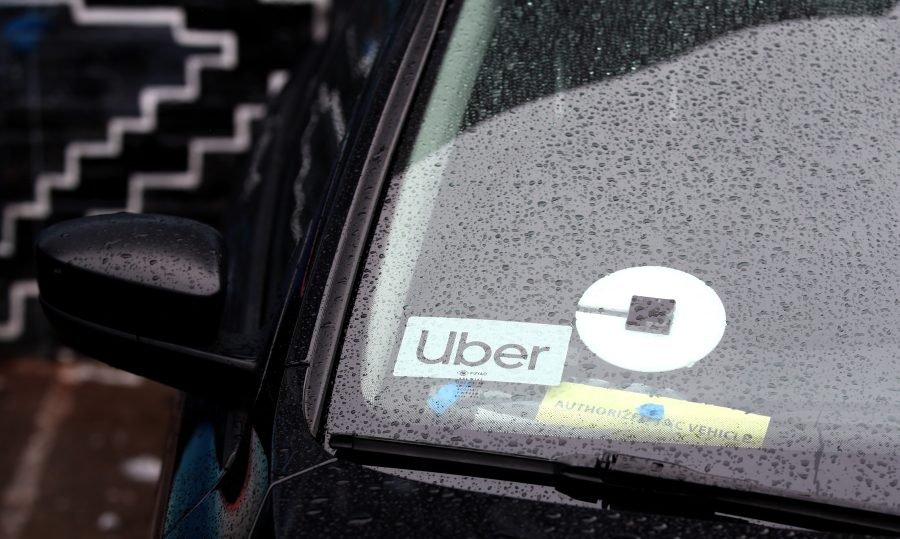Uber Files show how the platform pressed politicians as it entered European markets

This week, a consortium of news organizations published a series of articles about the so-called Uber Files — more than 120,000 documents, texts and emails initially leaked to The Guardian newspaper.
The files show how, between 2013 and 2017, Uber lobbied aggressively to enter and dominate otherwise tightly regulated taxi markets.
It’s the subject of “Quality Assurance,” where we take a second look at a big tech story.
Marketplace’s Kimberly Adams interviewed Ben King, a senior journalist for BBC News covering economics, who’s been following the rollout of these documents.
King said Uber’s strategy in Europe was to enter new markets first and ask permission later. The following is an edited transcript of their conversation.
Ben King: Now, Uber is a highly unusual company, and it was trying to break into taxi markets around the world which were often tightly regulated and protected. And it used some very controversial tactics to do that, and that’s all been well documented before. But what’s amazing about these leaks now is how willing a lot of politicians were to talk to them and help them.
Kimberly Adams: So Uber’s expansion in Europe began in France. What specifically happened there?
King: Well, it launched in 2011, and taxi drivers were obviously furious at this new competition. But the heat really got turned up in 2014, when it launched a new service called UberPop, which allowed people without professional licenses to charge for rides. Now, Emmanuel Macron is president of France now. But back in 2014, he was economy minister, and he met with Uber’s then-chief executive, Travis Kalanick. And Macron agrees to work with Uber to rewrite the rules covering ride-sharing. And then in 2015, when taxi drivers are actually rioting in the streets about UberPop, he then says to Kalanick, “I will gather everyone together to correct the law.” Now, Uber says that favorable regulations weren’t introduced after that. And Mr. Macron was asked about it on Tuesday, and he said he was proud of what he’d done, that it had created thousands of jobs. And he would do it again tomorrow and the day after tomorrow.
Adams: And so then how has Uber responded to all this reporting?
King: Well, Uber wants to draw a line under everything that went on while Travis Kalanick was in charge, and he left the company in 2017. It says its past behavior “wasn’t in line with present values,” and it’s a different company today. And the new chief executive, Dara Khosrowshahi, was “tasked with transforming every aspect of how Uber operates,” and has “installed the rigorous controls and compliance necessary to operate as a public company.”
Adams: Here in the U.S., can we take what’s happened in Europe as maybe an indication that Uber used similar tactics here?
King: Well, Uber has definitely faced resistance from regulators in the U.S. and from existing taxi services. And lobbying was part of its playbook to fight back against that. But what was remarkable about the Uber Files was how high their lobbying efforts took them in Europe.
Adams: And what does this reporting show more broadly about how tech firms approach lobbying? And, do you think we can expect any regulation as a result of all this?
King: In France, the president’s completely unapologetic, as [I just mentioned]. And in the U.K., politicians mentioned in the past have said, “Look, we were keen to attract tech investment to our country. So we went out and met with U.S. entrepreneurs, and we were open about that being our policy.” Even though a lot of those meetings, it turns out, weren’t declared. Some of the rules about lobbying in Brussels and London have been tightened a bit since the period covered by the Uber Files. But democracy campaigners have argued that all this is more evidence that the rules perhaps aren’t tight enough.
Related links: More insight from Kimberly Adams
The International Consortium of Investigative Journalists, the group of reporters and news organizations collaborating on this story, has a summary of Uber’s lobbying strategy during the platform’s global expansion.
The Guardian’s articles on the Uber Files include one in which company leaders encouraged employees to pull the “kill switch” and shut down access to Uber’s servers during government raids.
The Guardian’s podcast “Today in Focus” has an interview with the former Uber employee who leaked the documents: Mark MacGann, who was Uber’s chief lobbyist in Europe, the Middle East and Africa.
We have a statement from Uber about MacGann, which said: “he is in no position to speak credibly about Uber today.”
Uber is not just undergoing scrutiny in Europe, the company now faces yet another legal battle in the U.S.
TechCrunch reports that this week, attorneys filed a complaint in San Francisco alleging that more than 550 female passengers were assaulted by their Uber drivers. The plaintiffs are seeking damages and accusing the company of being “fully aware” of the scope of the problem but failing to introduce significant safety measures for passengers.
Uber told TechCrunch that it cannot comment on ongoing litigation, but it is keeping safety at “the heart” of its work.
The future of this podcast starts with you.
Every day, the “Marketplace Tech” team demystifies the digital economy with stories that explore more than just Big Tech. We’re committed to covering topics that matter to you and the world around us, diving deep into how technology intersects with climate change, inequity, and disinformation.
As part of a nonprofit newsroom, we’re counting on listeners like you to keep this public service paywall-free and available to all.
Support “Marketplace Tech” in any amount today and become a partner in our mission.

















